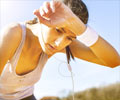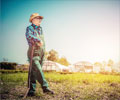Summer, the hottest season of the year is here. Exposure to extreme heat during summer can cause a wide range of heat-related diseases and injuries. Here are a few tips to stay safe during the hot summer months.

‘Exposure to extreme heat during summer can cause a wide range of heat-related diseases and injuries. So, make sure to protect your sensitive skin from the sun's ultraviolet (UV) rays by remaining in shaded areas and if you are traveling abroad ensure that you get the right travel vaccinations to boost your immune system and keep infectious diseases at bay.’
Read More..




Here are five facts about fireworks that Garcia says are important to know:Read More..
- Sparklers burn at a temperature of greater than 1,000 degrees — that’s five times hotter than boiling water! An adult, never a child, should light and dispose of a sparkler.
- Most burns are caused by simple fireworks such as firecrackers, sparklers and bottle rockets. All types of fireworks come with a significant risk of injury including blindness, third-degree burns and permanent scarring.
- One out of four victims of firework-related accidents are not the users. So, it is important to be aware of your surroundings when people are using fireworks. Always have a bucket of water available.
- All residual or “dud” fireworks should be soaked with water before disposal. Many can remain hot and able to cause significant burns for extended periods.
- All burns, especially to the hands and face, should be evaluated immediately at a burn center.
Sun Protection
Sun exposure is important and healthy when in appropriate amounts. It is necessary for making vitamin D, and it boosts mood. But too much sun is harmful for anyone. “It is a myth that people with skin of color do not get sunburns,” says Johns Hopkins dermatologist Nashay Clemetson, M.D. Although the incidence of skin cancer is lower in people with darker skin tones, people of color can develop skin cancer. These cancers are often diagnosed at advanced stages, resulting in poorer outcomes.
To promote sun safety, here are some facts Clemetson shares with her patients who have dark skin:
- Remain in shaded areas when the sun is at its peak intensity (usually between 10 a.m. and 4 p.m.).
- Remember that ultraviolet light — ultraviolet A (UVA) and ultraviolet B (UVB) — can damage the skin, eyes and immune system, regardless of skin color or tone, and may cause varying degrees of burns. Repeated sunburns lead to wrinkling, premature aging, and skin cancers.
- Be mindful of medications you’re taking. Some antibiotics and medicine for controlling blood pressure make the skin more sensitive to the sun.
- Wear broad-spectrum sunscreen — sun protection factor 15-plus — on exposed areas of the skin. Reapply sunscreen every two hours (every 80 minutes if perspiration is significant or when swimming).
- Wear ultraviolet protection factor clothing, sunglasses and wide-brimmed hats.
Norovirus/Travel-related Sickness
Signs of norovirus, a highly contagious gastroenteritis, may include diarrhea and vomiting, among other symptoms. Johns Hopkins professor of medicine and infectious disease specialist Cynthia Sears, M.D., says in the U.S. norovirus may present among passengers on cruise ships and airplanes, and in other places where people are in close proximity to one another.
Here are some tips that Sears recommends in hopes of decreasing travel-related sickness:
- Wash your hands with warm water and soap for at least 20 seconds after contact with contaminated surfaces. Hand sanitizers do not reliably kill norovirus, so hand-washing is very important.
- Avoid contact with people who have symptoms of a gastrointestinal virus.
- Throw out any food that might be contaminated with norovirus. Thoroughly clean, with a bleach-based household cleaner or diluted bleach, surfaces potentially contaminated by vomit or stool from people who are ill.
- Do not prepare food for others if you are ill or for at least two days after gastrointestinal symptoms stop.
Advertisement













